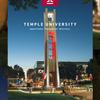Temple prioritized inclusive and intensive community involvement to help establish the principles that informed and guided development of the presidential profile, recruitment and ultimately the selection of our 15th president, John Fry.
To learn more about the presidential search process at Temple University, see the search timeline, meet the Search Advisory Committee and read responses to frequently asked questions.
Position Specification
The search provided an opportunity for a new leader to join Temple University during a period of dynamic transformation. We are hopeful for our future and remain as committed as ever to our founding mission of access and affordability. We are poised to continue leading education, research and healthcare while identifying opportunities that advance our reputation and quality while navigating challenges and the evolving landscape of higher education.
In collaboration with Spencer Stuart, the Presidential Search Advisory Committee identified the primary experience and capabilities critical to leading Temple University. Insight from the community report informed the final position specification. View the required qualifications, duties and responsibilities for the next president.

Community Engagement Report Research Findings
The Collective Genius (TCG), the research and strategy firm the university has partnered with, gathered insights and engaged widely across the university community over 30 hours in the first phase of the search.
After conducting virtual and in-person feedback sessions and distributing a universitywide survey, TCG synthesized the key findings, which are outlined below.
The community is confident that we are at a turning point for Temple: the next president must embody what distinguishes us, build on our momentum and harness our collective strengths so we are positioned on a positive, ambitious path forward.
The Temple community clearly appreciates that the vitality and success of the university, its neighbors and the region are interdependent and want an experienced leader that both ‘gets it’ and is able to lead with trust at this critical juncture. The engagement work reflected in this report will be invaluable to the search.”

Pedro Ramos
President and CEO, Philadelphia Foundation; member, Search Advisory Committee
These findings emphasize our common points of pride in Temple, opportunities and challenges for the university, and desired attributes that are critical to successfully leading Temple.
Points of pride: Together, we are confident in our defining strengths and that they should inform the search. These include how we uphold Temple’s mission to make higher education accessible; how we prioritize diversity, equity and inclusion; our R1 research status and climb in the U.S. News and World Report rankings; the tenacity and drive of our students; and our commitment to and the significance of our responsibility to our neighbors and communities.
Challenges and opportunities: The top three action items we believe our next president must address are safety; improving relationships with our neighbors and community; and sustainable financial stability and enrollment.
Leadership traits: The next president should possess the traits necessary for leading an urban, public institution—someone who is compassionate and visionary. What will ultimately set this candidate apart is someone with a commitment to teaching, research and service; demonstrated advocacy for higher education opportunities and accessibility; and prior relevant experience.
